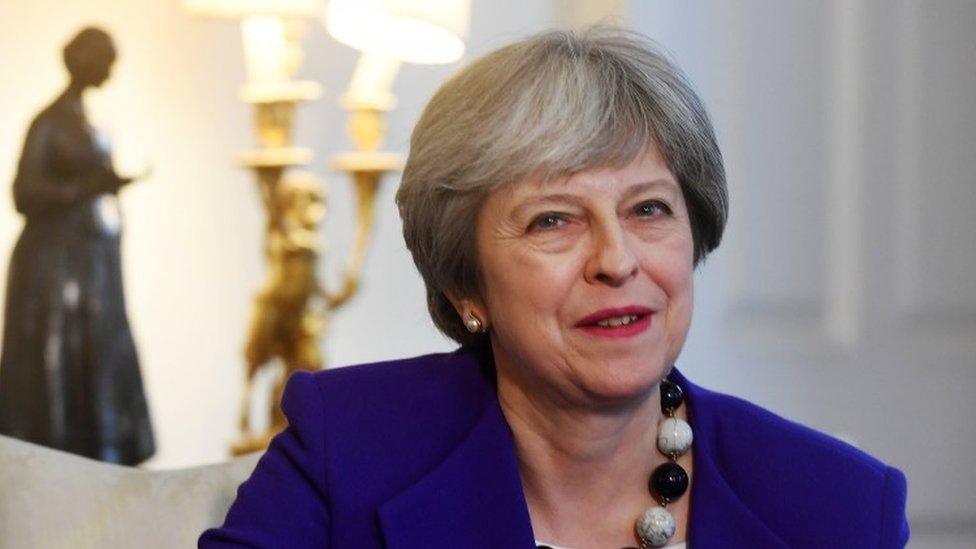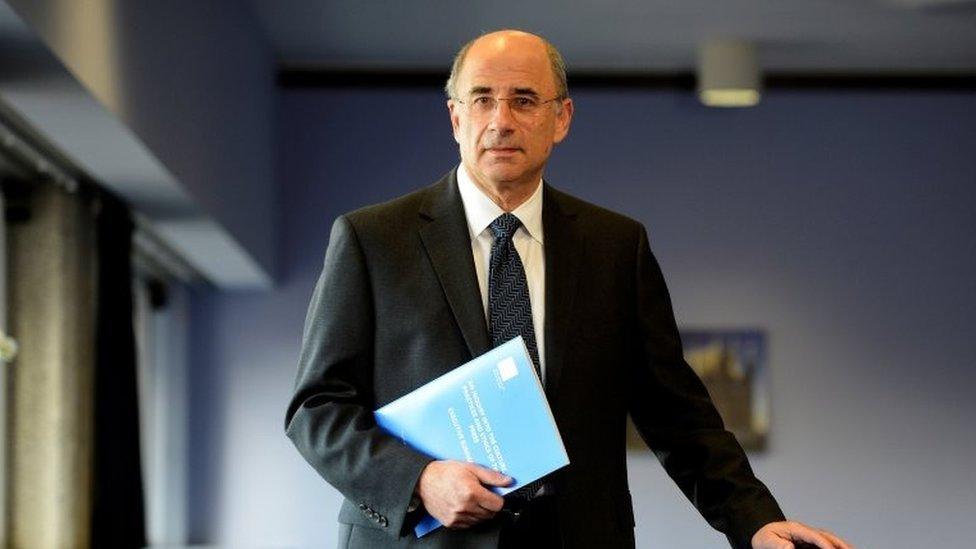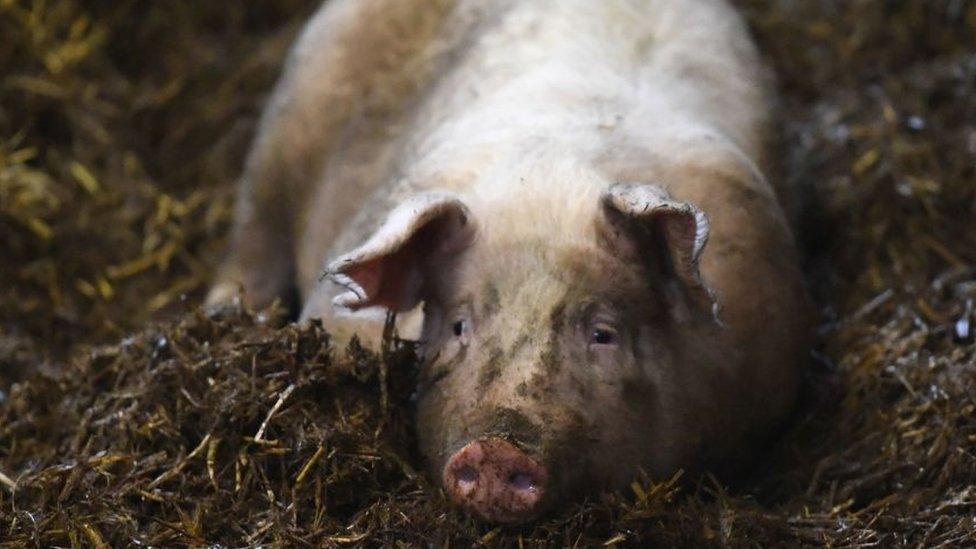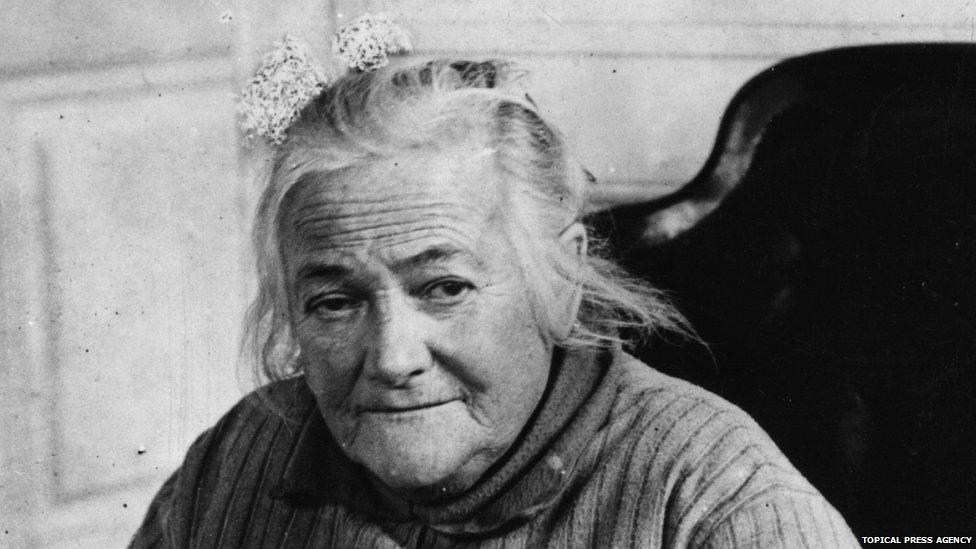Week ahead in Parliament
- Published

Theresa May will make a major statement on Brexit in the House of Commons
There will be a flare-up in the Brexit phoney war on Monday when Theresa May takes questions from MPs about the policies in her big Brexit speech but after that things quieten down, with sporadic guerrilla activity in various select committees. In the House of Lords many hours of genteel skirmishing lie ahead during the committee stage consideration of the European Union Withdrawal Bill but probably no actual votes.
The rest of the week's legislating - on data protection and energy price caps in the Commons - will provide moments of controversy, but overall the parliamentary agenda continues to be pretty insipid. There is, however, plenty of interesting action on the committee corridor - in particular, the big joint inquiry by the Work and Pensions and Business committees into the collapse of Carillion is simmering away nicely.
With the Spring financial statement from the Chancellor due the following week, expect the usual probing from MPs and the usual coy replies from ministers, and keep an eye on the continuing accumulation of amendments to the two big Brexit measures, the Trade Bill and the Taxation (Cross Border Trade) Bill, which are due to return to the House of Commons at some point.
Here's my rundown of the week ahead.
Monday 5th March
The Commons opens (2.30 pm) defence questions. With defence ministers appearing to conduct an open campaign for a major increase in their budget, this may turn into a bit of a campaign rally. That will be followed by any ministerial statements or urgent questions. It's already has been confirmed that the Prime Minister will be making a statement on Brexit policy, allowing MPs to question her on the contents of her speech from Friday. This looks set to be a major occasion, lasting several hours.
The day's legislating is on the Data Protection Bill, which has already been through the Lords. This will be the second reading debate, but expect some fallout from the announcement by the Culture Secretary, Matt Hancock, cancelling the second stage of the Leveson Inquiry into press conduct. During its Lords consideration, peers defeated the government and added a "Leveson" clause, providing that courts must award costs against publishers that are not members of an approved regulator, in data protection claims, unless satisfied that the claim could not have been resolved by arbitration provided by the regulator.

Sir Brian Leveson says ministers have broken promises to phone hacking victims.
The Lords also added a clause requiring the culture secretary to establish an inquiry into allegations of data protection breaches by news publishers, within three months of the passing of the data protection legislation. It is not really a surprise that the government wants to overturn these changes. That was clear when peers made them but Mr Hancock has confirmed the point with his statement announcing that the Leveson inquiry will be closed.
The government will also have to respond to a third Lords defeat. Peers voted to require the Information Commissioner's Office to maintain a register of personal data of national significance that is controlled by public bodies, and to prepare a code of practice setting out practical guidance in relation to such data.
Watch out, too, for members of the digital, culture, media and sport ccommittee. As a result of their inquiry into fake news, they are increasingly concerned about the way big internet companies use billions of points of personal data on individuals to target both advertising and political messages at them. Committee chair Damian Collins is concerned that there is no real understanding of the processes they use, and that the state has little ability to police their activities. Some of those concerns might surface in the debate.
My committee pick is the European scrutiny committee hearing (4.30pm) on EU withdrawal with the Chancellor, Philip Hammond. The Cabinet's leading advocate of soft Brexit faces questioning from Brexiteer patriarch Sir Bill Cash. Bring popcorn. (They follow up with David Davis, the Brexit Secretary, on Tuesday).
In Westminster Hall (4.30pm) MPs debate e-petition 200000: "Make British Sign Language part of the National Curriculum," which has attracted over 27,800 signatures so far. Then they turn to e-petition 207616 on car insurance which calls for insurance to be based on the vehicle instead of the driver. There are over 55,900 signatories to this petition so far.
The Lords questions to ministers (2.30pm) range across controls on air guns, GPs taking early retirement, and replacement services for women's prisons following the closure of Holloway Prison.

House of Lords is expected to debate amendments to the EU Withdrawal Bill on animal sentience
Then peers re-apply their noble noses to the grindstone, as they resume committee stage consideration of the European Union Withdrawal Bill. This is day four, where issues involving family law and animal sentience, and the supremacy of EU law will be discussed. The action is proceeding at snail's pace, and the sitting could well last till midnight, with the government taking the precaution of keeping around 60 peers present, just in case arch-Remainer Lord Adonis attempts to force an unexpected vote.
Tuesday 6th March
The Commons opens (11.30 am) with justice questions, and that could well be followed by urgent questions or ministerial statements, held over to make way for the Prime Minister's Brexit statement the day before.
The day's ten minute rule bill, from the Conservative Trudy Harrison, seeks to prohibit the use of wild animals in travelling circuses. She argues that it is ethically unacceptable to use wild animals in travelling circuses. The bill has government support, which means its path might be smoothed to allow it to go into committee. Keep an eye out for a formal second reading vote at the close of Commons business at some future Friday sitting.

MPs will debating legislation that would set a limit on energy bills
The main debate will be on the second reading of the promised Domestic Gas and Electricity (Tariff Cap) Bill. This could be quite a piquant occasion as a Conservative government brings in a measure first proposed by Ed Miliband as Labour leader. The aim is to provide some protection to customers who don't shop around for the cheapest possible energy deals. A cross-party alliance of backbenchers pressed for this measure but some MPs are not completely content with the detail so expect a few markers to go down for changes that they wish to see. Keep an eye on former minister John Penrose, one of the most vigorous campaigners for a price cap.
In Westminster Hall, proceedings open with a debate on the proposed merger of British Transport Police Scottish division with Police Scotland led by Scottish Conservative Douglas Ross (9.30 - 11am). The Scottish Tories have been goading the SNP about this issue for months, so this could be a bit tasty. My committee pick is the home affairs committee hearing (2.30pm) on hate crime and its violent consequences, with Alison Saunders, the Director of Public Prosecutions..
In the Lords (2.30 pm) questions to ministers include Viscount Ridley asking about the use of gene editing in agriculture. After that, peers perform their final rites over the Laser Misuse (Vehicles) Bill with a rapid third reading debate.
Then they turn to the detail of the Secure Tenancies (Victims of Domestic Abuse) Bill where they will consider report stage amendments on preventing victims from paying for evidential matters and ensuring victims can remain where a violent partner has gone.
Wednesday 7th March
Opening business in the Commons is Scotland questions (11.30am) followed at noon by Prime Minister's Questions.
The main debates are on subjects chosen by two of the smaller opposition parties, Plaid Cymru and the DUP. Plaid promise a Brexit-related debate but are being cagey about the precise subject. On the committee corridor, the joint investigation into the collapse of the government mega-contractor Carillion, by the business committee and work and pensions committee rolls on (9. 15am) with two panels of witnesses from big institutional investors.
In the Lords business starts earlier than usual (11am) because of the snail's pace progress of the committee stage debates on the EU Withdrawal Bill. This will give some hours of extra debating time where the focus will be on Henry VIII powers, public authorities, taxation, criminal offences, and data protection. Question time will start at the normal time of 3pm and peers will pick up the debate again after that.
Thursday 8th March
The Commons opens (9.30am) with environment, food and rural affairs questions, followed by mini-question times to the MPs who speak for the Church Commissioners, the House of Commons Commission, the Public Accounts Commission and the Speaker's Committee on the Electoral Commission.

Parliament will mark International Women's Day on Thursday 8th March
The day's main debate is on Vote 100, the centenary of the law which allowed the first women, and all men, to vote for the first time. The debate also marks the fact that it's International Women's Day on Thursday 8th March.
In the Lords (11am) ministers answer questions with an International Women's Day theme: supporting women who are victims of domestic violence and keeping EU employment protections for women after Brexit. Peers will then run through all stages of the Finance (No. 2) Bill, which contains measures from last November's Budget. Because this is a money bill, peers are forbidden from interfering with it but it does give them a chance to debate wider economic matters.
The International Women's Day debate follows, where the House will mark the steps being taken to press for progress on gender equality across the world.
Neither House sits on Friday.